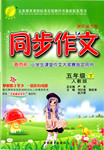题目内容
.
_______ not like Jim to be late for class. He is always on time.
| A.Here’s | B.That’s | C.It’s | D.There’s |
C
解析

练习册系列答案
 春雨教育同步作文系列答案
春雨教育同步作文系列答案
相关题目
题目内容
.
_______ not like Jim to be late for class. He is always on time.
| A.Here’s | B.That’s | C.It’s | D.There’s |
C
解析

 春雨教育同步作文系列答案
春雨教育同步作文系列答案